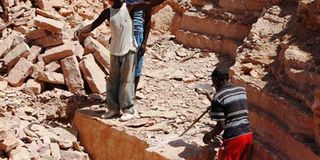Building jobs suffer as Mandera quarries remain closed

Stone miners at the Bur Abor quarry in Mandera County in 2016. Quarrying will remain suspended for longer in Mandera until a security audit is done and better security measures put in place. PHOTO | FILE | NATION MEDIA GROUP
What you need to know:
- Silence engulfs the quarries after all mining activities were banned last year.
- Jobs have shrank and construction projects in the northern Kenya town have somewhat stalled.
- Quarrying in some areas has continued under unclear circumstances.
The sounds of mallets crushing stones once dominated quarry sites in Mandera County.
The lure of money had sent many jobless and youthful men, especially from central Kenya, to casual jobs in at least 60 quarries despite threats of Al-Shabaab terror attacks.
But now silence engulfs the quarries after all mining activities were banned last year and it appears that there are no plans to reopen them any time soon.
In effect, jobs have shrank and construction projects in the northern Kenya town which borders Somalia and Ethiopia have somewhat stalled.
SECURITY AUDIT
The Nation has learnt that that quarrying activities will remain suspended for longer until a security audit is done and better security measures put in place.
“Until we do a complete audit on the security situation in Mandera, we shall not be able to re-open the quarries,” County Commissioner Onesmus Kathya told the Nation in an exclusive interview.
DILEMMA
Quarry owners now find themselves in a dilemma after the national government declared the business closed citing insecurity posed by Al-Shabaab militants.
The militants targeted quarry workers in more than 60 sites in the vast county, mostly killing the non-locals who worked in the mines.
Quarrying in Mandera has been in a limbo since May 4, 2018, forcing most miners to leave the county for lack of jobs.
This is after four miners were killed by suspected Al Shabaab militants at Shimbir Fatuma quarry in Mandera South.
Earlier in 2014, 36 miners were killed at night by suspected Al-Shabaab militants at Koromey quarry, a new form of brutality that shook the town.
But quarrying in some areas has continued under unclear circumstances.
SECURITY RAIDS
Local security organs have on several occasions raided the quarries and arrested the miners found working.
Despite efforts by the quarry association and the county government to convince the security team led by the then County Commissioner Kutswa Olaka to reopen the quarry fields, the government has remained adamant that they are not safe for workers.
The association sued the government over the matter and the High Court lifted the ban on May 4, 2019, but the quarries remain shut.
“We obtained orders from a court of law to re-open the quarries but the security agencies have ignored it and continued to harass and arrest our workers,” said Mr Mohamed Abdullahi Bore, chairman of Mandera East Quarry Owners Association.
COURT ORDER
Mr Kathya admitted having seen the court order but said the security situation could not allow the re-opening of the mines.
“Continued sighting of militants within is reported on daily bases making it difficult to re-open the mines but once we have our plans and systems in place, we shall open them,” said Mr Kathya.
The latest police harassment was reported last Thursday.
It is alleged that more than 20 security officers raided Jirma quarries, beat up miners, burnt their foodstuffs and destroyed their tools and utensils.
“All our workers on site were affected because their clothes were burnt by police officers who came in three vehicles at the quarries,” said Mr Bore.
Security bosses have denied any plans of raiding the sites to chase away workers.
MEETING
Last month, Mandera leaders met Interior Cabinet Secretary Fred Matiang’i and the ban was discussed.
Mandera Governor Ali Roba, Senator Mahmud Mohammed, six MPs and lawyer Abdikadir Mohammed attended the meeting.
Dr Matiang’I, while challenging the leaders to question why neighbouring Ethiopia is peaceful and free from terror, announced that a structured opening of quarries would be done using a zoned and phased approach.
The leaders communicated the CS’s message back home but the quarry owners failed to agree on a formula.
“Our leaders told us of the plan on how to open the quarries which we accepted but the police have continued to harass us,” said Mr Bore.
Dr Matiang’i asked the leaders to identify four quarries to be re-opened as a measure of security response in the county.
The adamant leaders insisted on having Mr Olaka (former county commissioner) transferred, a prayer which was granted.
The State started by banning quarrying at night but the militants still managed to attack, kill and injure miners in their residences in the town.





